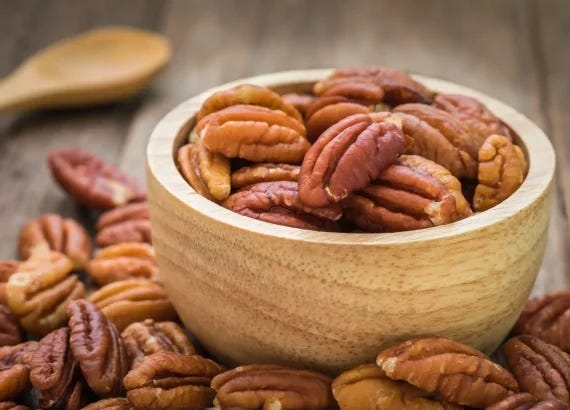Moving Beyond Superfoods and Focusing on Balanced Diet Patterns for Optimal Health
In the quest for a healthy diet, many individuals concentrate on specific food components—avoiding carbohydrates, increasing fiber intake, reducing saturated fats, and consuming more antioxidants. An engineer friend of mine once designed a diet by meticulously crafting a basic meal plan that defined desirable and undesirable components. He then constructed a highly artificial block of food containing the recommended nutritional elements, which he portioned for breakfast, lunch, and dinner to achieve optimal health. Although his anecdotal experiment lacks sufficient data to draw definitive conclusions (he survived the diet despite its lack of palatability), the component model has been rigorously tested by scientists and companies in pursuit of a magic supplement (fiber drinks, antioxidant pills), often without conclusive benefits.
The Component Model of Food: An Example with Pecans
Consider pecan nuts as an example. A 300 g (11 oz.) serving of pecans contains 28 g of fiber, meeting 100% of the USDA's daily fiber recommendation (good!) 1. However, it also contains 21 g of saturated fat, which is the maximum recommended limit (bad!) 2. From a component model perspective, one might assume that the health effects would depend on which component's impact is more significant the benefits of fiber or the adverse effects of saturated fats. The expectation would be that increasing consumption amplifies these effects.
However, the health outcomes of consuming pecans do not align with this simplistic component model. A meta-study analyzing dietary habits and lifespan across 16 studies and involving over 80,000 deaths found that a small daily intake of nuts (about 40 peanuts or 15 pecans) can reduce all-cause mortality by nearly 20%3. This study, titled "Food Groups and Risk of All-Cause Mortality: A Systematic Review and Meta-Analysis of Prospective Studies," demonstrates that beyond this modest quantity, there is no additional benefit or harm from consuming more nuts. After this threshold, extra nuts become merely empty calories that neither benefit nor harm health.
Debunking the Superfood Myth
Many books and articles promote the concept of "superfoods," claiming certain foods provide exceptional health benefits compared to others or advising strict dietary components like avoiding carbs or eating more fiber. However, longevity research suggests broad food categories (fruits, vegetables, processed meats, etc.) encompass the most significant health impacts. Even for foods that contribute to health and longevity, there exists a threshold—such as the 20 g of nuts—beyond which no further benefit is observed, regardless of the type of nut.
A Research-Based Guide to Diet, Exercise, and Habits
This blog aims to explore the diet, exercise, and lifestyle habits that contribute to a long, healthy life. By leveraging the latest research with all-cause mortality as the primary measure of benefit, I will elucidate where common wisdom aligns with scientific evidence, where it is partially correct but overstated, and where it is entirely incorrect.
FAQs
Q: Why do many people focus on food components rather than specific foods when trying to eat a healthy and balanced diet?
A: Many believe that by controlling individual food components like carbohydrates, fiber, and saturated fats, they can optimize their diet for better health. However, epidemiological studies show that more than food components, it’s more effective to focus on food categories (vegetables, whole grains, fish…) than individual food components.
Q: Has the component model of food been scientifically tested and proven effective?
A: Yes, the component model of food has been scientifically tested, but its effectiveness depends on individual factors. A balanced whole-food diet is generally recommended for optimal health.
Q: Can eating a large quantity of pecan nuts with high fiber content outweigh the adverse effects of saturated fats?
A: Contrary to the component model's expectations, research suggests4 that consuming a small handful of nuts a day provides health benefits and makes them a valuable addition to a nutritious and balanced diet plan.
Q: Are there certain food categories that have a more significant impact on health and longevity?
A: Yes, research on longevity5 indicates that overall food categories, such as fruits, vegetables, and processed meats, have a greater influence on health outcomes than focusing on individual food components.
Q: Is there a limit to the benefits of consuming certain foods for health and longevity?
A: Yes, even for foods that promote health and longevity, there appears to be a threshold. For example, once you consume a certain amount of nuts, such as 20g, consuming more of that food type provides little additional benefit.
Q: Are low-fat or fat-free products always healthier choices?
A: Not necessarily. While low-fat options can be beneficial in some cases, they often compensate with added sugars or artificial ingredients. Choosing whole, minimally processed foods is generally a better approach.
Q: Can a specific diet or food component prevent certain diseases?
A: Some diets, like the Mediterranean diet, have shown potential in reducing the risk of certain diseases6. However, no single food or diet can guarantee complete prevention; overall lifestyle and balanced diet plays a significant role.
Q: Is it better to focus on counting calories or on food quality when trying to manage weight?
A: Quality matters more than just calorie counting. Nutrient-dense, whole foods can help you feel more satisfied and provide essential vitamins and minerals, promoting sustainable weight management.
Q: Is it necessary to avoid all carbohydrates to lose weight?
A: No, it's not necessary to eliminate all carbs. Eating carbohydrates to a limit7 and choosing complex carbohydrates like whole grains and legumes, along with balanced diet portions, can support weight loss and overall health.



